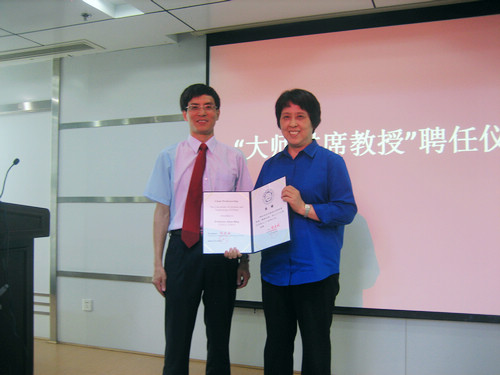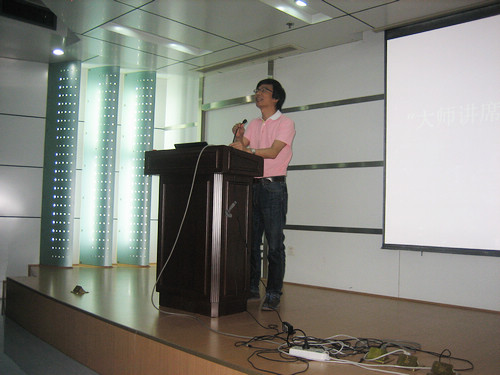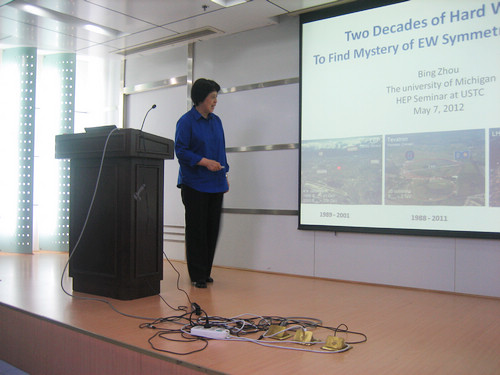Bing Zhou was invited by USTC as Chair Professorship
-
 [2012-05-19]
[2012-05-19] On May 7th 2012, USTC announced the conferment of title of Chair Professorship upon ZHOU Bing, professor of the University of Michigan, U.S.A. The ceremony was held in the 210 academic hall, department of modern physics USTC. Professor ZHAO Zhengguo, “Thousand Talents Program” professor of USTC,presided over the ceremony, and Vice-president CHEN Chusheng conferred the certificate of honor on Professor ZHOU Bing.


Vice-president CHEN Chusheng and Vice-dean of School of Physics Science YE Bangjiao gave a short speech respectively and congratulated ZHOU Bing on her success. ZHOU Bing expressed her pride of being a member of USTC.
Professor ZHOU Bing is a well known experimental high energy physicist. She obtained her BS degree from USTC, China in 1982, and obtained Ph. D. from MIT, US in 1987. She became a faculty member at Boston University in 1990. In 1998 she was recruited by the University of Michigan (UM) to lead the ATLAS research project. She has been the Principal Investigator of the US Department of Energy (DoE) and the National Science Foundation (NSF) for the ATLAS Project at UM in past ten years. She obtains US DoE/NSF research grants over million Dollars every year. She was the Associate Chair for research in the physics department at UM. She serves as the US ATLAS Muon precision detector construction leader, and the US muon software and calibration project leader. In addition, she serves as the members of US ATLAS computing resources management board and the US Great Lakes Tier-2 Advisory Board. She has served as the ATLAS experiment executive board member for three years, as the member of the US DoE/NSF ILC detector R&D Review Committee, as the DoE/NSF major research proposals reviewers and major physics papers reviewers (e.g. Phys. Rev. Letter, Nuclear Instruments and Methods paper…). She has also served as the Oversee Reviewer for "Changjiang Scholars Programme of China".
Professor Zhou is currently an active researcher for hadron collider physics studies. The research projects including on-going D0 experiment at Tevatron in Fermilab, and the near future experiment, ATLAS, which will start to take data in 2008. Her research focus on ‘big science’ projects to study the most fundamental physics questions, such as finding the mystery of the electroweak symmetry breaking to understand the original of mass; to develop the new technologies to design and build the large particle physics detectors for hadron colliders in energy frontier (such as for the 40 TeV Super-Collider in US and for the 14 TeV Large-Hadron-Collider at CERN, Geneva). Because of her most comprehensive physics studies to guide the large detector design work, and her creative detector R&D achievements with precision tracking detectors for both inner tracker and for large muon detectors, she was the only physicist in US awarded twice of the SSC Fellowships, one for postdoctoral follow and one for junior faculty. She was elected as the American Physics Society Follow in 2001 because of her renovation in successful R&D work for large scale pressurized drift tube muon chambers for the LHC experiment. Only top 5% outstanding physicists in US could receive such honor. Professor Zhou developed and implemented many very effective physics analysis techniques for particle physics researches with colliding beams. At Large-Electron-Positron experiment, L3, she was the first one developed the b-jet tagging algorithm using the silicon vertex detector, and developed the method for Higgs boson (the corner stone for electroweak symmetry breaking) detection through hadronic jets final states: the application of Artificial Neutral Networks in high energy physics studies. Her analysis method development made very large impact on the Higgs search program at LEP. These methods are still the powerful tools in physics analysis at Tevatron and at LHC. Because of her excellent leadership roles in L3 silicon detector project for LEP II program and the Higgs search program, she was rewarded by US National Science Foundation the ‘Career Development for Women Scientist’. She led a multi-million ATLAS muon detector construction task, successfully delivered 80 largest precision muon detectors to ATLAS experiment. She is now lead the ATLAS diboson physics study activities. This study will provide a most sensitive way to test the Standard Model in highest energy frontier and to search for new physics with diboson final states in TeV energy scale. She has been the principal authors of electroweak physics studies with the D0 experiment on W-width measurement and on WZ events observations. The WZ production cross-section measurement at D0 allowed us to set the most restricted anomalous triple-gauge-boson couplings from Tevatron.

After the ceremony, professor ZHOU Bing was invited to give a wonderful lecture titled “Two Decades of Hard Work to Find the Mystery of EW Symmetry Breaking”.
(State key Laboratory of Particle Detection and Electronics,Department of Modern Physics, School of Physics Science)
ZHOUbing

- Tunable Nonlinear Hall Effect at Room Temperature in Telluri...
- USTC Realizes Dispersion-Selective Band Engineering in Artif...
- USTC Achieves First Loophole-Free Test of Hardy's Paradox
- USTC Proposes New Constraints on Exotic Spin-spin-velocity-d...
- Antiferromagnetic Phase Transition Observed in Fermionic Hub...
